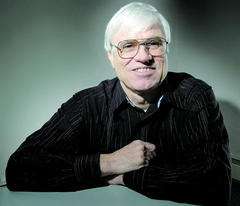|
Staff photo by Jim
Evans |
|
Hypnosis for: more
|
|
We Hypnotherapist
works at dispelling myths FAIRFIELD
-- Hypnotism has come a long way from the hocus-pocus days of
swinging pocket watches and spinning spirals. In fact, said
Ernest VanDenBossche, a certified hypnotherapist, the practice has
gained acceptance as a healing treatment worldwide, associated with
helping post-surgical cancer patients and those trying to quit
smoking, losing weight and other concerns. Today, he
said, is the second annual World Hypnotism Day, celebrating the
professionalism and skills of hypnotists everywhere. "It's
really about getting the word out about hypnotism and its
advancements through time to the general public," said
VanDenBossche, 55. "We're hearing a lot from TV talk shows
about hypnotism and creative visualization for health -- hypnotism
is a type of creative visualization, because this is what we're
doing, we're going into the mind and creating something that we want
for our future." World
Hypnotism Day is scheduled to be celebrated tonight beginning at 7
at the Universalist Unitarian Church on Silver Street, Waterville.
VanDenBossche said he will address the gathering and hypnotize
willing visitors in a group setting. Recognizing
the day is about dispelling the myths and misconceptions of
hypnotism, while explaining the many benefits, according to
VanDenBossche. He said features on hypnotism and the health benefits
associated with it have appeared in such publications as NewsWeek,
Good Housekeeping, Canadian Living, Shape and O Magazine. He said the
practice can help people accentuate positive thoughts for positive
results. Health issues, professional goals and activities people
want to improve, such as sports performance, can be achieved by
mentally breaking bad habits, according to VanDenBossche. "Smoking
is a great example," he said. "Smoking and weight
loss." He said
hypnotherapy can work well for people suffering from hypertension
and can ease physical pain by decreasing brain activity associated
with suffering. It also can help alleviate stress, anxiety and the
pain of medical procedures including childbirth. But,
VanDenBossche said, results are all about the person being
hypnotized, not the therapist doing the hypnotizing. Like going to a
doctor for a broken arm, he said, the healing comes from inside the
body, not from the doctor. "Your
mind sends the signal to your body to do the healing, so it's in
your mind," VanDenBossche said. "So with hypnotherapy and
health, again you plant those things in your mind, but the
suggestions for change need to be positive. "Your
mind heals that." VanDenBossche,
with his partner Bonnie Lee Gibson, operate Wavelengths
Hypnotherapy on Main Street in Fairfield. He said a person has to
want to be hypnotized and has to want to implement the changes being
suggested before the therapy can work. The word
hypnosis has its roots in the Greek word meaning "sleep,"
he said. When one is experiencing the effects of hypnosis, an alert
stage of sleep -- similar to the state experienced in meditation --
is achieved. During that
time suggestions are made to the subconscious mind, bypassing the
critical mind and going straight to the spot where habits are either
controlled or allowed to go unattended. "You have
to be dedicated to that change," he said. "If your wife
wants you to go in and quit smoking and you don't want to, it isn't
going to work -- you have to want the change." VanDenBossche
said during the last century hypnosis was used almost exclusively by
stage acts, in which people -- all of whom had been screened by the
hypnotist -- clucked like chickens and took their clothing off on
command to the delight of audiences. Since then the
medical and therapeutic benefits of hypnosis have come into
prominence. In 1955 the
British Medical Association endorsed the practice in medical school
education. The American Medical Association followed suit three
years later, recognizing hypnosis as a medical treatment, according
to VanDenBossche. Doug Harlow --
861-9244 dharlow@centralmaine.com
|
